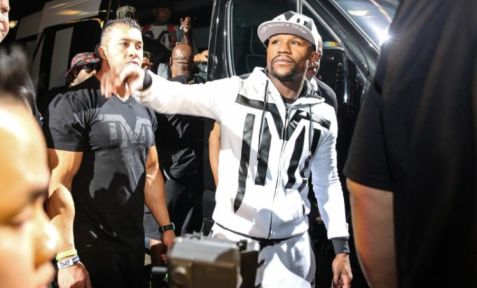The life of a professional sportsman is one coveted by the many, but one realised by only a select few. Glamour, celebrity and lifestyle, combined with the prospect of significant financial gain, all come together to create the perfect storm making a career in sport so appealing. But for every Floyd Mayweather or Oscar De La Hoya, that becomes a household name, there are exponentially more athletes that neither you, nor I, have ever heard of. It is important to emphasise that many professional sportsmen and women live lives of relative anonymity, earning modest sums of money. However although the levels of remuneration can vary dramatically, these individuals share the same need to strive to be better, to regularly test themselves against their peers, to sacrifice and dedicate their lives to something, all the while living with the knowledge that injury could force retirement at any time, from what is still inherently a short career in the best of cases.
It is this additional depth of perspective on the rose tinted view we are all perhaps guilty of defaulting too, when exposed to prominent athletes in the media, that is vital when considering the question of whether the commercial side of being a professional has begun to detract from the purist elements of why athletes got into sport in the first place. In turn does this impact or detract from the core reasons why we love to watch it? In short the question is: are athlete’s human being’s or commercial assets?
This year saw what was billed as ‘the fight of the century.’ Floyd Mayweather vs Manny Pacquiao broke all records for viewing figures, pay per views (4.4 million to be exact) and revenue generation. In profile, it propelled both men into a new stratosphere, no longer limited to the boxing world, but transcending their sport. Unsurprisingly the two protagonists on the night were also rewarded handsomely for their efforts (the boxers ranked 1st and 2nd respectively on this year’s Forbes Celebrity top 100 earners list). Floyd alone earnt in excess of $300 million, which is a new record for an athlete in a single year, with the vast majority of this coming as a direct result of the May 2nd super fight against Pacquaio. The loser on the night Manny himself saw a cool $160 million of the proceeds. Irrespective of whatever one’s personal take on how the fight itself panned out, both men did very well financially from it.
When it later transpired that Manny had carried an injury into the fight, most interested parties were somewhat disappointed that the contest had been at the very least compromised in some way. Some took the matter more seriously, going so far as to file law suits aimed at recovering lost betting stakes on the basis that the injury had not been declared prior to the fight. In a very real sense, if Pacquio had been badly hurt during the course of the fight, would the fact he had been permitted to fight at all now be viewed in a harsher light?
Indeed when considering the Billions of dollars that were interwoven into casino gambling, ticket sales, restaurant bills, car rentals, accommodation, private jet hire, plane tickets and the list goes on, can anyone really be surprised that the bout took place even though one of the fighters was injured?
On the one hand you could contest that the members of Team Pacquio have a fiduciary duty to their fighter, to ensure his best interests are protected. It is common place after all for boxers to enter into battle carrying injuries, and it would not be considered wise to divulge these weaknesses to your opponent in advance, if your intention is to fight through the problem. On the other hand, logically one would have to assume that if the financial elements of the equation were removed, would there have been any resistance to rescheduling the fight? Would Manny have fought Floyd with an injury if there was nothing on the line other than personal pride and the thrill of victory?
In a practical terms there was little to no chance that an event of the magnitude of what took place on May 2nd was ever going to be cancelled. Too many tickets had been sold, too many sponsors had put their weight behind it, all too many hotel rooms had been booked and too many influential people had cleared their diaries to attend. From a humane view point, was it in the best interests of Paquiao to fight on May 2nd? In the abstract, even the very nature of ‘best interest’ is a subjective one. Many would argue that to risk a 160 million dollar pay day would not be in the best interests of anyone. The May 2nd fight does well in providing the extreme case example, but if the injured fighter were a journeyman, fighting in front of a few hundred people with no media presence, for a pay check that he needed to make his rent and buy food for the coming month, does this ultimately make the decision any different?
Another aspect to consider is why the fight took so long to happen? Most boxing fans would agree that the contest between Mayweather and Pacquio should have happened years ago. There has been a lot of hearsay and conjecture around PED testing and such, but ultimately the reason for the delay has been attributed to the parties’ concerned inability to agree how the finances around the bout would be divided up. This is common place in boxing, Prize Fighters are just as described, and more often than not will do battle with whomever offers the biggest pay day. A direct result of this is that the public see less of the fights they want to see, and the fighters are increasingly inhibited from making the fights that for purely sporting reasons should be made. Increasingly, the best fighters are kept apart, constructing and preserving records, building reputations in the hope that in doing so one day they too can be in a super fight, off the back of which they can retire off the proceeds.
These two sides of the same coin demonstrate the direct contradiction between the sporting and commercial drivers in boxing. Without the financial motivations, the best fighters would be matched against each other to see whom the best truly was. This scenario would give the fans what they want, and in turn give the fighters the test their competitive natures must surely crave?
The now infamous politics of boxing all essentially stems from this genesis and when coupled with the fractured nature of the sports sanctioning bodies, things would appear to be getting worse in this regard rather than better. The latest PBC, AL Haymon led movement seems to be attempting to buck this trend. However this is still at a relatively early stage in its development as a platform.
In many sports, National Governing Bodies will have influence over the athletes to varying degrees, often providing some support structures and direction in the areas of athlete welfare and development. In the sport of boxing, where fighters are at greater risk than in most other disciplines, it would seem logical that an increased level of responsibility should be placed on guiding the athletes on what is best for them both now and in the future. Many boxers struggle with life outside of the ring once the fighting is over, as without the proper direction in earlier years, unless success has ensured long term financial security, often there are very limited options for fighters that have dedicated themselves to the sweet science to the detriment of academic or other vocational skill bases. With the right support structure and team around them, many fighters do manage to prepare admirably for life after boxing, however this is by no means guaranteed and often all the focus is directed on the boxing, leaving no room for anything else. Should the sport take more responsibility for providing better guidance and assistance to fighters, preparing them for life after the sport? It would seem at present the mechanisms in place are aligned with the priority of extracting the maximum amount of revenue from a boxer’s career, with no real thought to what happens in retirement, until it is too late.
The ironic side to this paradox is that all fighters want to be that ‘commercial asset’. The blood sweat and tears is really all about getting to the top of the sport, and with that comes the money and the glory. Somewhere along the way is where these lines get blurred. This article is not here to say what’s right or wrong. Where the lines should be drawn will vary from one individual to another based on their unique set of circumstances. However there is no getting away from the fact the sport should be doing more to protect the most vulnerable in its ranks. Those that pay their dues are all too often left short changed when the lights are turned out. Boxing needs a strategy and a voice to champion the cause. Unfortunately that doesn’t appear to be forthcoming.
- Matthew Lynch / Matthew_Lynch_








Leave a Reply